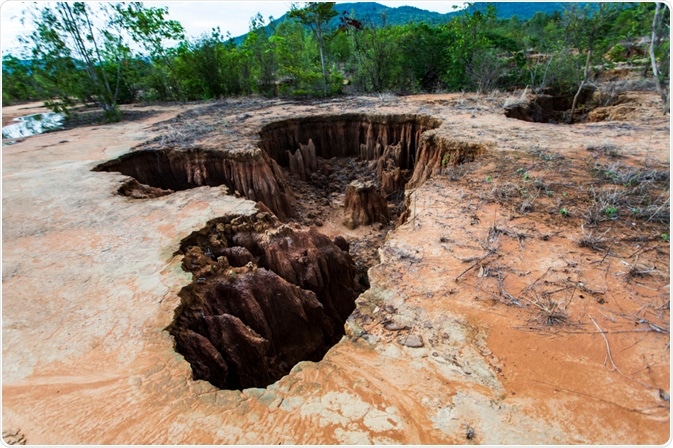Soil erosion can negatively impact agriculture by reducing crop yields and quality. In an era where the population continues to grow rapidly, the agricultural sector is being put under increasing pressure to respond and produce enough food for our growing society.

Image Credit: vivatchai/Shutterstock.com
However, the impacts of climate change and deforestation are increasing soil erosion, which is damaging the productivity of farms around the world.
Below we discuss what soil erosion is and how it is caused, as well as how it impacts agriculture. Finally, we discuss what are the necessary steps that need to be taken to prevent soil erosion, and why.
What causes soil erosion?
Soil erosion refers to the process whereby the top layer of soil is removed. While it is a natural process, caused by the weather, it is also caused by human activity, and it can cause harm to agricultural processes when it occurs rapidly and excessively.
One of the leading causes of soil erosion is deforestation. Although incredibly bad for the environment, the slash-and-burn technique has become a popular method of clearing forest areas, often for use in agriculture.
However, this method leaves areas vulnerable to soil erosion by wiping out the trees whose roots helped keep the soil together and whose leaves protected the soil from heavy rainfall.
Another major factor contributing to soil erosion is climate change. As global warming leads to more vigorous hydrological cycles, leading to increasing levels of total rainfall and more frequent intense rainfall events such as storms, more soil is being washed away as a result.
As well as changes in rainfall, global warming is impacting on temperature, carbon dioxide concentrations, and solar radiation, which also contribute to soil erosion.
Agricultural processes themselves can also cause soil erosion. Grazing animals can induce this effect by eating the plants covering the topsoil, exposing it to the elements, and churning up the ground pacing back and forth over its surface.
But what is the impact of increasing levels of soil erosion on agricultural practices?
The impact of soil erosion on farming
Over the last few decades, many studies have proven the detrimental impact of soil erosion on the crops produced on the eroded land. Data has revealed a relationship between reduced crop yields and soil erosion. Evidence has also been collected to show that this effect is dependent on soil type, crop type, and agricultural management systems.
Studies have shown that around 10 million hectares of land are abandoned each year due to this lack of crop productivity caused by soil erosion. This effects some regions more than others, with Africa, Asia, and South America averaging at a loss of 30 to 40 hectares annually.
This means that in these regions, food security is threatened by reduced crop yields and failing farms. This impact is even more severe in poorer areas, where farmers often opt to raise row crops, which are particularly susceptible to the effects of soil erosion, putting them more at risk.
Also, there has been a recent trend in the US for farmers to switch to certain row crops, like corn, because its value has doubled, while its susceptibility to soil erosion is putting entire farms at risk of financial failure.
Many agricultural practices both organic and traditional can themselves contribute to soil erosion. Because of this, farmers are being encouraged to amend their processes to prevent soil erosion, conserving the ground so that it can continue to produce healthy crop yields, and support animal life.
Organic farming, for instance, is less associated with soil erosion than traditional agricultural methods. Studies have shown that organic farming methods improve soil quality.
In comparison to soil samples studied from traditionally farmed land, organic land has increased levels of the soil enzymes dehydrogenase, phosphatase, and urease, as well as a significantly higher microbial biomass and a higher polysaccharide content. These factors are known to increase the soil’s resistance to soil erosion, particularly increases in polysaccharide content which acts as a binding agent in the soil.
Switching to organic farming methods is being encouraged in the agricultural sector not only to reduce soil erosion and product crop yields but also for the other numerous environmental and health benefits it brings.
It is estimated that as much as 80% of the world’s agricultural land is suffering from what is considered moderate or severe levels of erosion. Also, almost all human food source comes from the land, with an estimated 99.7% of food calories coming from this source and just 0.3% coming from aquatic ecosystems.
This highlights the vital need to protect the land that food is grown on to prevent a food crisis.
With the soil being eroded at rates between 10 to 40 times faster than the rates at which it is being renewed, it is essential to address the causes of soil erosion to limit the detrimental effects to agriculture.
Sources:
- Lal, R. and Moldenhauer, W., 1987. Effects of soil erosion on crop productivity. Critical Reviews in Plant Sciences, 5(4), pp.303-367. https://doi.org/10.1080/07352688709382244
- Pimentel, D. and Burgess, M., 2013. Soil Erosion Threatens Food Production. Agriculture, 3(3), pp.443-463. https://www.mdpi.com/2077-0472/3/3/443
- Pimentel, D., 2006. Soil Erosion: A Food and Environmental Threat. Environment, Development, and Sustainability, 8(1), pp.119-137. https://link.springer.com/article/10.1007/s10668-005-1262-8
- Nearing, M., Pruski, F. and O'Neil, M., 2004. Expected climate change impacts on soil erosion rates: A review. Journal of Soil and Water Conservation, 59(1), pp.43-50. http://www.jswconline.org/content/59/1/43.abstract
- Reganold, J., Elliott, L. and Unger, Y., 1987. Long-term effects of organic and conventional farming on soil erosion. Nature, 330(6146), pp.370-372. https://www.nature.com/articles/330370a0
Further Reading
Last Updated: Apr 7, 2020